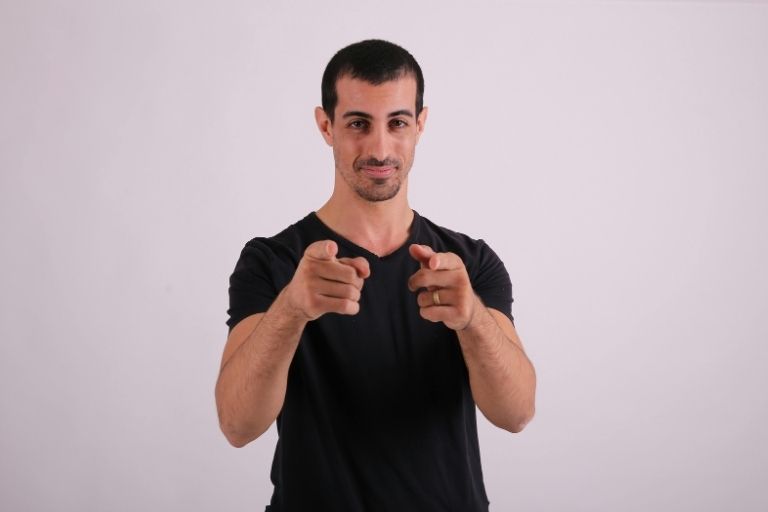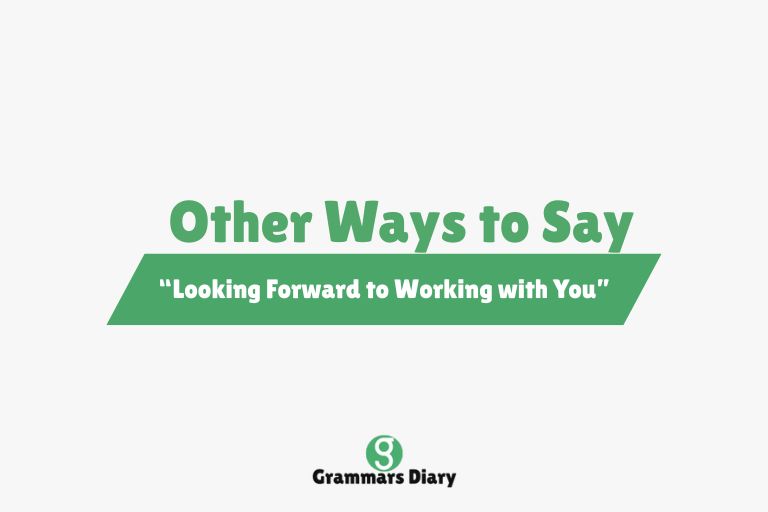“Looking forward to working with you” is one of the most commonly used phrases in professional communication, especially in emails, proposals, or after meetings. It’s a polite way to express enthusiasm or anticipation about collaborating with someone. While it gets the point across clearly, relying on this phrase too often can make your communication sound repetitive or generic.
Whether you’re writing to a new client, a teammate, or a potential business partner, it’s useful to have a variety of phrases at your disposal that can convey similar sentiments with different tones—some more formal, others more casual. This article explores alternative ways to say “looking forward to working with you,” along with the meanings, usage tips, and long-form examples for each.
Other Ways to Say “Looking Forward to Working with You”
1. I’m excited to collaborate with you.
Example: “I’m excited to collaborate with you on this upcoming campaign.”
Meaning: Expresses eagerness and enthusiasm about the project or partnership, showing energy and commitment to the work ahead.
Usage: Best used in creative, team-based, or startup environments where a more dynamic tone is welcomed.
2. I’m eager to begin our work together.
Example: “I’m eager to begin our work together and bring this idea to life.”
Meaning: Conveys anticipation and motivation to get started, showing that you’re already mentally invested in the process.
Usage: Suitable for initial outreach, onboarding conversations, or project kick-offs.
3. I can’t wait to start collaborating.
Example: “I can’t wait to start collaborating with your team.”
Meaning: Highlights a personal sense of anticipation and excitement, suggesting strong enthusiasm for teamwork.
Usage: Ideal in less formal settings or when building a personal rapport.
4. I’m looking forward to a successful partnership.
Example: “I’m looking forward to a successful partnership between our two companies.”
Meaning: Adds a professional and optimistic tone, implying trust and belief in a positive outcome.
Usage: Best for B2B relationships, joint ventures, or long-term agreements.

5. I’m optimistic about what we’ll achieve together.
Example: “I’m optimistic about what we’ll achieve together during this collaboration.”
Meaning: Focuses on the results and shared goals, highlighting a team-oriented mindset.
Usage: Great for results-driven industries or team introductions.
6. I’m thrilled to work alongside you.
Example: “I’m thrilled to work alongside you and learn from your experience.”
Meaning: Combines professional courtesy with personal enthusiasm, showing genuine interest in the collaboration.
Usage: Suitable for mentorships, cross-functional projects, or internships.
7. It’ll be great to join forces on this.
Example: “It’ll be great to join forces on this challenging but rewarding task.”
Meaning: Uses a metaphorical tone to express unity and combined effort, while sounding upbeat and encouraging.
Usage: Works well in creative fields or casual but goal-oriented projects.
8. I’m excited to get started.
Example: “I’m excited to get started on this new opportunity with you.”
Meaning: Straightforward and enthusiastic, expressing eagerness without formality.
Usage: Appropriate for emails, project launches, and new hires.
9. I anticipate a productive collaboration.
Example: “I anticipate a productive collaboration and a successful outcome.”
Meaning: More formal and goal-focused, this phrase signals professionalism and purpose.
Usage: Ideal in formal emails, contracts, or consulting engagements.
10. I welcome the chance to work together.
Example: “I welcome the chance to work together on this initiative.”
Meaning: Indicates openness, humility, and a positive attitude toward the upcoming relationship.
Usage: Best in initial introductions or proposals.
11. I appreciate the opportunity to collaborate.
Example: “I appreciate the opportunity to collaborate with your team on this project.”
Meaning: Highlights gratitude and professionalism, especially useful when you’ve been invited to join something.
Usage: Strong choice for thank-you emails or follow-ups after interviews or meetings.
12. I’m glad to be on board.
Example: “I’m glad to be on board and look forward to contributing.”
Meaning: Friendly and inclusive, this expression helps reinforce team spirit.
Usage: Common during onboarding or introductions to new teams.
13. It’s a pleasure to be working with you.
Example: “It’s a pleasure to be working with you and your talented group.”
Meaning: Polished and cordial, this phrase blends respect and friendliness.
Usage: Great in formal or semi-formal correspondence.
14. I’m enthusiastic about this collaboration.
Example: “I’m enthusiastic about this collaboration and confident in what we’ll create.”
Meaning: Directly communicates passion and belief in the outcome.
Usage: Perfect for kickoff meetings or joint initiatives.
15. I’m thankful for the chance to work with you.
Example: “I’m thankful for the chance to work with such a creative team.”
Meaning: Emphasizes gratitude and a positive attitude toward the opportunity.
Usage: Works well in follow-ups or when joining high-stakes projects.
16. I’m ready to get started with you.
Example: “I’m ready to get started with you and contribute wherever I can.”
Meaning: A proactive, confident phrase that shows you’re not just excited but prepared to begin.
Usage: Best used in emails after meetings or contract signings.
17. I’m hopeful about our collaboration.
Example: “I’m hopeful about our collaboration and the value we’ll bring to the project.”
Meaning: Highlights a sense of positivity and confidence, while maintaining a humble tone.
Usage: Great for early-stage discussions or introductory calls.
18. I’m keen to see what we can accomplish together.
Example: “I’m keen to see what we can accomplish together over the coming months.”
Meaning: Expresses a strong personal interest in the success of the partnership.
Usage: Fits well in client relationships, research projects, or new partnerships.
19. It’s exciting to move forward with this.
Example: “It’s exciting to move forward with this plan alongside your team.”
Meaning: Shows motion and progression, implying momentum and shared goals.
Usage: Suitable for update emails or post-negotiation communication.
20. I’m honored to be part of this team.
Example: “I’m honored to be part of this team and contribute to our shared mission.”
Meaning: Adds a tone of humility and respect, often used in hierarchical or mission-driven environments.
Usage: Effective for nonprofits, government roles, or corporate onboarding.
21. I’m enthusiastic about what lies ahead.
Example: “I’m enthusiastic about what lies ahead for our departments.”
Meaning: Offers a forward-looking and optimistic outlook without being overly casual.
Usage: Useful in internal memos, leadership updates, or cross-team communications.
22. I’m pleased to be working with such professionals.
Example: “I’m pleased to be working with such professionals on this initiative.”
Meaning: Compliments the team or individual while expressing anticipation.
Usage: Well-suited for new vendor relationships or team restructuring.
23. It’s wonderful to collaborate with someone of your expertise.
Example: “It’s wonderful to collaborate with someone of your expertise on this complex task.”
Meaning: Personal and respectful, this phrase recognizes the other party’s skillset.
Usage: Excellent for consultants, freelancers, or industry experts.
24. I look forward to the journey ahead.
Example: “I look forward to the journey ahead and the impact we can make together.”
Meaning: Metaphorical and emotionally resonant, emphasizing long-term teamwork.
Usage: Appropriate in mission-oriented or high-vision projects.
25. I’m committed to making this collaboration a success.
Example: “I’m committed to making this collaboration a success from day one.”
Meaning: Strongly emphasizes dedication and partnership, appealing to reliability and shared goals.
Usage: Ideal for project leads, new hires, or kickoff messages.
When to Use Different Alternatives
In Professional Settings
In formal or structured work environments, you may prefer expressions that convey respect, preparedness, and long-term thinking. Phrases like “I anticipate a productive collaboration,” “I’m honored to be part of this team,” or “I’m committed to making this collaboration a success” strike the right balance of enthusiasm and professionalism without sounding overly casual or vague.
In Client Communications
Clients often respond well to language that blends friendliness with confidence. Using expressions such as “I appreciate the opportunity to collaborate,” “I’m optimistic about what we’ll achieve together,” or “It’s exciting to move forward with this” shows that you’re approachable but focused on results.
In Friendly Collaborations
When you’re working with peers, teammates, or individuals with whom you have an informal or equal-level relationship, feel free to use phrases like “I can’t wait to start collaborating,” “It’ll be great to join forces,” or “I’m glad to be on board.” These expressions keep the tone human and approachable without losing clarity.
Conclusion
While “Looking forward to working with you” is a reliable go-to phrase, overusing it can dull your message or make it seem automated. Fortunately, as we’ve explored in this article, there are plenty of alternative expressions that can help you express your excitement, commitment, and enthusiasm with greater nuance, variety, and personal tone.
By choosing your words more deliberately, you can make your professional communication more engaging, tailored, and memorable—helping you build stronger working relationships from the very first message.
FAQs
What does “Looking forward to working with you” mean?
It’s a polite and professional way to express your anticipation and enthusiasm about collaborating or beginning a partnership with someone.
Is “Looking forward to working with you” too formal?
Not necessarily. It’s neutral and works in both formal and informal situations, though sometimes it may feel overused. In more casual or creative environments, choosing alternatives can help personalize your tone.
What can I say instead of “Looking forward to working with you”?
You can say things like “I’m excited to collaborate with you,” “I appreciate the opportunity to work with you,” or “I’m committed to making this collaboration a success,” depending on the tone you want to convey.
When should I use a more formal alternative?
When writing business proposals, formal emails, or communicating with senior executives or new clients, formal phrases like “I anticipate a productive collaboration” or “I’m honored to be part of this team” are ideal.











